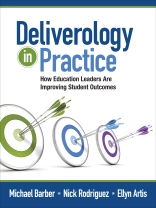Everything you need to implement school change that gets results!
If you’ve been wondering how to effectively lead and manage results-driven, system-wide implementations, look no further. Internationally recognized education expert Michael Barber explores exactly how to translate policy into practice for long-term, measurable results.
Building on his groundbreaking book, Deliverology 101, Barber provides proven methods and clear steps to achieve successful policy implementation and offer practical solutions for reviving stalled reform efforts. New cases studies and embedded links help you develop a delivery ‘skillset’ for building capacity, effective coalitions, and a coherent, flexible plan for implementation.
Leaders and staff at both national and local levels will learn to:
- Establish a Delivery Unit to set clear, measureable goals and build a reform coalition
- Understand delivery through data analysis and strategic progress monitoring
- Plan for delivery with explicit, day-to-day implementation planning updated with proven methods from years of practice
- Drive delivery with progress monitoring, momentum building, and course corrections
- Create an irreversible delivery culture by identifying and addressing challenges as they occur
Don’t leave your education policy implementation to chance. Use this new field guide to get your implementation on the right track today!
表中的内容
Preface
Acknowledgments
About the Authors
Introduction: The American Implementation Problem
Part 1. Develop a Foundation for Delivery
Chapter 1A. Define Your Aspiration
Chapter 1B. Review the Current State of Delivery
Chapter 1C. Build the Delivery Unit
Chapter 1D. Establish a Guiding Coalition
Part 2. Understand the Delivery Challenge
Chapter 2A. Evaluate Past and Present Performance
Chapter 2B. Understand Root Causes of Performance
Part 3. Plan for Delivery
Chapter 3A. Determine Your Reform Strategy
Chapter 3B. Draw the Delivery Chain
Chapter 3C. Set Targets and Establish Trajectories
Part 4. Drive Delivery
Chapter 4A. Establish Routines to Drive and Monitor Performance
Chapter 4B. Solve Problems Early and Rigorously
Chapter 4C. Sustain and Continually Build Momentum
Part 5. Create an Irreversible Delivery Culture
Chapter 5A. Build System Capacity All the Time
Chapter 5B. Communicate the Delivery Message
Chapter 5C. Unleash the “Alchemy of Relationships’
Conclusion: Over to You
Index
关于作者
Sir Michael Barber has been chief education advisor at Pearson since September 2011 and is the founder of Delivery Associates. In 2001, he founded the Prime Minister’s Delivery Unit in No10, Downing Street, which he ran until 2005. In this role he was responsible for ensuring delivery of the government′s domestic policy priorities across health, education, crime reduction, criminal justice, transport and immigration. The sustained focus on delivery from the heart of government, and the processes the PMDU developed, were a significant innovation in government, of interest to numerous other countries and global institutions such as the IMF and the World Bank. Tony Blair described the PMDU as “utterly invaluable.” From 2005 to 2011 he was a partner at Mc Kinsey and Company where he played a leading role in creating a public sector practice and founded the global education practice. In 2009 he founded, in Washington DC, the Education Delivery Institute, a not-for-profit organisation that works with more than a dozen US States to apply systematic delivery approaches to improving outcomes in schools and public higher education. Since 2009, on behalf of the British government, he has visited Pakistan over 30 times to oversee a radical and, so far, successful reform of the Punjab education system. He is the author of numerous books and articles, such as How to Run a Government published by Penguin in 2015 and Instruction to Deliver (Methuen 2008), which tells the story of his time in Downing Street, and was described by the Financial Times as “one of the best books about British government for many years.” Deliverology 101 is the textbook on how to deliver in government and was written as the curriculum for the Education Delivery Institute.












